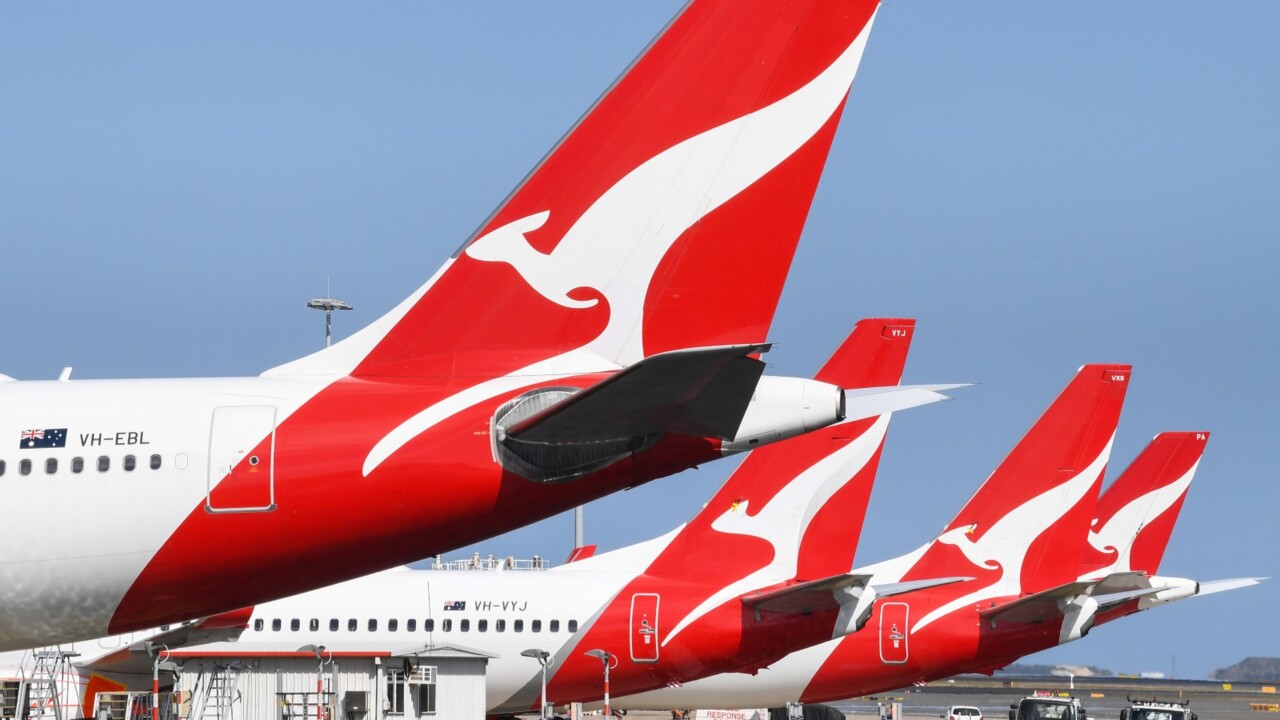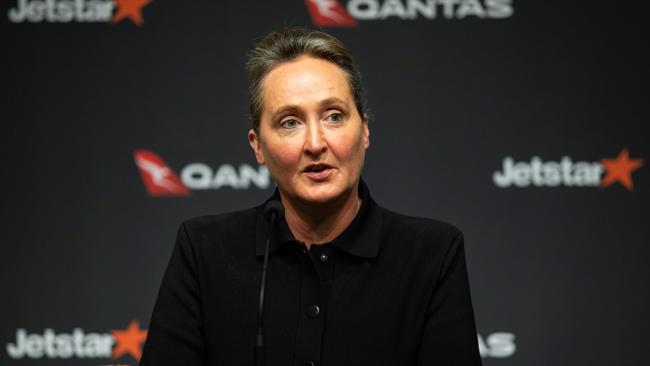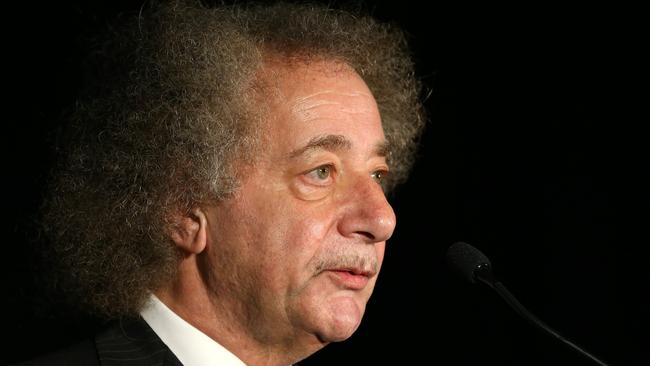
In taking aim at the airline, Australian Competition and Consumer Commission boss Gina Cass-Gottlieb has called out Joyce’s Qantas for allegedly and deliberately charging customers for a service it never intended to deliver.
If this doesn’t send a message to Qantas chairman Richard Goyder that his airline has a trust problem, then a potential fine likely to run into the tens of millions of dollars – or even higher – should.
The blockbuster ACCC legal action caps off a disastrous week for Qantas, where it was caught out fudging the value of $500m worth of Covid flight credits outstanding and ire has also has been building over its lobbying efforts to prevent rival Qatar from putting on more international flights into Australia.

It all amounts to a bigger cultural issue of arrogance building inside the airline.
And this is where Goyder should heed the warning: The history of corporate Australia is littered with the rapid unravelling of far bigger companies be it from banks and mega-miners that have suffered from hubris.
The first job of incoming Qantas chief executive Vanessa Hudson when she takes charge in November will be to quickly define herself as different to Joyce when it comes to her approach to passengers.
But the worrying signs around corporate culture are there.
Cass-Gottlieb says for two years running, Qantas is the company for which ACCC has received the highest number of consumer complaints. Last year half of the total complaints around customer service going to the ACCC were in relation to Qantas.

More recently Joyce was attempting to play hardball with thousands of customers who had flight credits following groundings through the pandemic.
“These are indications of an approach to customer service that we consider falls short of the mark,” Cass-Gottlieb says in an interview.
These aren’t just the occasional travellers Qantas has put offside. A CEO of one of Australia’s biggest listed companies this week privately lamented that Qantas stands out in his mind as being hard to deal with. That’s telling for his business given it also ranks as a big commercial customer of the airline. Elsewhere, the Qatar decision prompted former Treasurer Peter Costello to declare Qantas “is one the most powerful players in Canberra”.
For his part, Joyce said the airline had underestimated the demand for travel coming out of the Covid pandemic. Qantas was still reeling from the extended groundings from the pandemic and he has apologised.
‘Heart of the matter’
The explosive ACCC case however goes to the heart of Qantas’ arrogance. It doesn’t take aim at flight cancellations themselves. Indeed there are often very good reasons for an airline to ground a flight or even be late, from weather, safety, crew availability or even airport capacity.
Rather the ACCC case deals with the airline’s alleged behaviour after it had cancelled the flights.
It claims Qantas was offering seats for sale on thousands of flights even after it had made the cut and dry decision to cancel them. In other words this is not about flights being cancelled, but promising something it allegedly never intended to deliver.

On average it took 18 days for Qantas to tell passengers who had paid for tickets that the flight was cancelled, the ACCC has alleged. It wasn’t just an inconvenience for passengers, it often came at a financial cost as well given bookings for hotels or other travel arrangements were impacted by the cancellations.
Qantas said it takes the ACCC’s allegations seriously and would examine them and respond in full in court. It also noted the period under the ACCC’s claim (May 2021 to July 2022), was a time of unprecedented upheaval for the industry coming out of Covid-19.
If the legal action makes it all the way to court, the reputational hits will keep coming. Senior managers are likely to be cross-examined as part of efforts by the ACCC to establish how far up the chain executives knew of the alleged activity. This could even see Joyce called to give evidence, even though he is likely to be long gone from the airline.
Cass-Gottlieb says if a court finds in favour of the ACCC, the consumer watchdog will be seeking a significant penalty.
“It’s important for us that the penalty sets a standard that is not just seen by Australian large companies simply as a cost of doing business, it needs to be high enough that it changes behaviour.”
Joyce is about to leave Qantas in a bind. His tough leadership has delivered again and again for the airline’s investors, but it has been at the long-term expense of customers and reputation.
Increasingly passengers have stopped listening to him as the airline steps from public relations mess to the next. This ranges from cosying up to politicians, lobbying to throttle capacity among rivals or even the airline’s rough start-up from Covid.

On Thursday too, Joyce was forced to backflip on the self-declared expiry of $500m of Covid flight credits. After conceding the credit pool was bigger than the $370m he had indicated just days earlier, Joyce removed the expiry date and has offered cash refunds for Qantas customers. That decision too followed the ACCC ramping up pressure and objecting to Qantas’ position that the credits should expire.
On Thursday Joyce acknowledged in a statement: “The credit system was not as smooth as it should have been.”
The reputational hits need to be contrasted with the stunning financial turnaround of Qantas. After being weeks from collapse through Covid, the airline is now delivering booming profits helped by soaring fares globally and steep job cuts early in the pandemic.
Customers need to accept airlines like Qantas have to make profits to allow them to attract necessary capital to keep investing in new planes, adding to capacity or upgrading terminals. Qantas has a massive fleet renewal program underway with more than $6.6bn of new planes on order for the next few years and more to come through to the end of the decade.
But it is all a balancing act. Joyce has done a great job at keeping investors happy but for too long this has come at the cost of customers. It’s time to dial down the corporate arrogance and give some ground.
The Weiss way
Clean-up specialist Gary Weiss certainly has a long road ahead as he attempts to work his magic on the ailing office tower owner Cromwell.
Weiss is not one to shy away from a corporate raid but his third act in delivering a turnaround now has the added pressure of an entire market in steep decline.
With interest rates set to remain higher for longer the question is whether Weiss and his backers, Singapore’s ARA, will get out ahead – or even at all – on the debt-heavy Cromwell.
The Cromwell woes contrast to gains across Weiss’ other projects. He is about to close a deal on selling his rebooted retirement village business Estria to private equity play Bain for $838m.

Weiss meanwhile moved into Ardent following the tourism play’s lethal accident at its Dreamworld park on the Gold Coast seven years ago. It’s been a grinding rebuild through Covid but Dreamworld is now earnings positive for the first time since the accident and delivering sales 25 per cent above pre-pandemic performance. Weiss also managed to exit Ardent’s US operations intact for $640m, finally delivering funds back to shareholders.
Through previous management teams Cromwell was built up over the years with little strategy other than to borrow to snap up offices across Europe, Singapore as well as a portfolio of second-tier offices across Australia.
Cromwell’s on-the-ground expertise was limited in Europe and the big headache now is an exit from a portfolio of Polish shopping centres at a painfully deep discount. The value of the Polish operations has fallen 21 per cent over the past year with Cromwell now securing commitment from a buyer for holdings.
The focus of Weiss, Cromwell’s chairman, is to get debt levels down through further asset sales while making sense of the ad hoc collection of buildings. He too wants to build out the potential of a $1bn diversified property fund operated jointly with the Australian Unity.
Cromwell’s direct gearing stood at 42.6 per cent at the end of June and the aim is to get this back closer to 30 per cent. With another $560m in sales earmarked to pay down debt, Weiss hopes to make more progress cleaning up the Cromwell’s $11bn commercial and office portfolio enough to make it simple enough to be attractive for possible takeover in time for the eventual turn in the cycle.
Meanwhile, Cromwall has noted that hybrid working is disproportionately hitting office demand for large employers. It says smaller tenants are “maintaining or increasing” their footprint in A-grade CBD buildings where Cromwall mainly operates.
Cromwell posted a loss of $443.8m for the year to end-June, hit by $492m in writedowns against properties. Even with debt a priority, Cromwell still paid a distribution of 5.5 cents per security, giving it a payout ratio above 90 per cent.
johnstone@theaustralian.com.au








After years of getting his way with governments, employees and even passengers, Qantas boss Alan Joyce has finally met someone who has pushed back. And this time it will be costly – but also the wake-up call that is needed.